 Ba Xuyen
Ba Xuyen
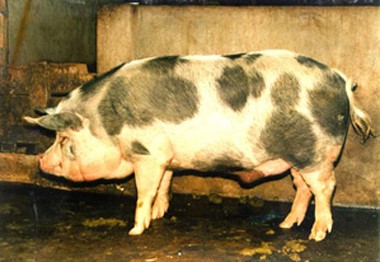 Ba Xuyen is a combination of French and
Chinese swine from composites of the Craonnais, or Bo Xu. These mut hogs were imported
around 1920, by French planters, and the Chinese pigs imported around 1900, by
Chinese traders. The Ba Xuyen is primarily found in South Vietnam along the
Mekong River delta. They have adapted well to the salty-water zones of that
area. The Ba Xuyen has a high backfat thickness that is usually around 42 mm
and it weighs nearly 100kg by 12 months of age. The Ba Zuyen also has a short
body, medium-sized ears and small legs, with roughly similar proportion of black
and white areas on the body. They have an average litter size of eight.
Ba Xuyen is a combination of French and
Chinese swine from composites of the Craonnais, or Bo Xu. These mut hogs were imported
around 1920, by French planters, and the Chinese pigs imported around 1900, by
Chinese traders. The Ba Xuyen is primarily found in South Vietnam along the
Mekong River delta. They have adapted well to the salty-water zones of that
area. The Ba Xuyen has a high backfat thickness that is usually around 42 mm
and it weighs nearly 100kg by 12 months of age. The Ba Zuyen also has a short
body, medium-sized ears and small legs, with roughly similar proportion of black
and white areas on the body. They have an average litter size of eight.

 Babi Kampung
Babi Kampung
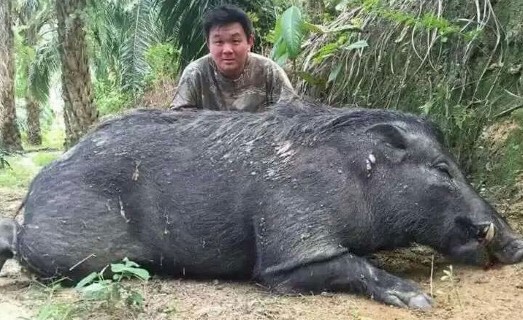 Babi Kampung, also known as "village pig," is a traditional breed of pig that is found in Indonesia. They are known for their hardiness and adaptability, as well as their ability to forage for food in the wild. Babi Kampung pigs have a black or dark brown coat, a large body, and a broad snout. They are known for their meat which is considered to be more flavorful and tender than commercial breeds. They are mostly raised by smallholder farmers and small-scale farmers, and the pig farming is considered to be a low-input and low-output system.
Babi Kampung, also known as "village pig," is a traditional breed of pig that is found in Indonesia. They are known for their hardiness and adaptability, as well as their ability to forage for food in the wild. Babi Kampung pigs have a black or dark brown coat, a large body, and a broad snout. They are known for their meat which is considered to be more flavorful and tender than commercial breeds. They are mostly raised by smallholder farmers and small-scale farmers, and the pig farming is considered to be a low-input and low-output system.

 Bamaxiang
Bamaxiang
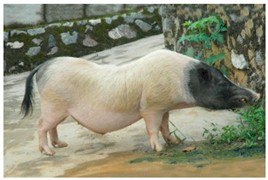 Bamaxiang pigs, also known as Bama Black pigs, are an indigenous breed of domestic swine originating from the Bama Yao Autonomous County in Guangxi Zhuang Autonomous Region, China. They are characterized by their distinctive black coloration, compact build, and hardy temperament.
Bamaxiang pigs, also known as Bama Black pigs, are an indigenous breed of domestic swine originating from the Bama Yao Autonomous County in Guangxi Zhuang Autonomous Region, China. They are characterized by their distinctive black coloration, compact build, and hardy temperament.
Size: Bamaxiang pigs are considered medium-sized hogs, typically weighing between 180 and 230 kilograms (397 and 507 pounds) at maturity.
They have a compact and muscular build, with a slightly arched back and a deep chest. Their heads are medium in size, featuring erect ears and a slightly dished snout.
Their coats exhibit a solid black coloration, ranging from deep black to slightly grayish-black. This distinctive black c ...

 Bantu
Bantu
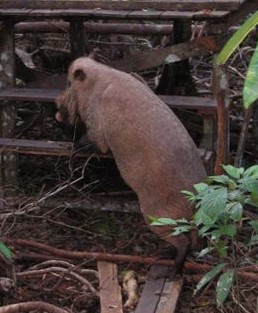 The Bantu is found in southern Africa, and is derived from early breeds of swine from Europe and Asia. Bantus are usually brown but can also be black and white with splotches of black spots.
The Bantu is found in southern Africa, and is derived from early breeds of swine from Europe and Asia. Bantus are usually brown but can also be black and white with splotches of black spots.
They are known for their hardiness, adaptability and ability to forage for food in the wild. They are known for their meat which is considered to be more flavorful and tender than commercial breeds. They are mostly raised by smallholder farmers and small-scale farmers. Bantu pigs are well suited to the hot, humid climate of Africa and are resistant to many of the diseases that plague commercial pigs. They are also known to be hardy and able to survive with minimal inputs, which makes them well-suited for smallholder farmers and for use in mix ...

 Basque
Basque
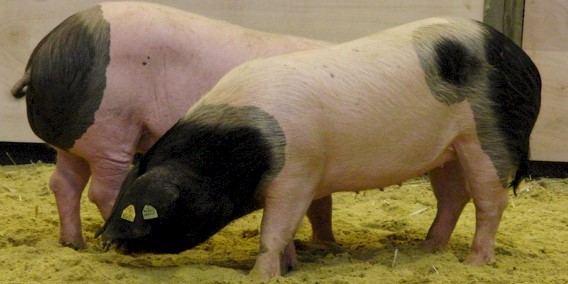 Basque pigs are a
breed of swine from Basque Country, France. They are piebald, black and pink.
Basque pigs are a
breed of swine from Basque Country, France. They are piebald, black and pink.What is today called the Basque pig is one of several historical breeds or breed types kept by the Basque peoples, and it was consolidated under the name only in the 1920s. Though they were relatively common in the early 20th century, Basque pigs had nearly disappeared by 1981, with fewer than 100 breeding sows left.
Today, the breed is preserved by small farmers in France and Spain who are dedicated to traditional Basque foods. Basque pigs grow more slowly and develop more fat than modern breeds like the Large White, making them less suited to intensive commercial meat production, but ideal for the creat ...

 Bazna
Bazna
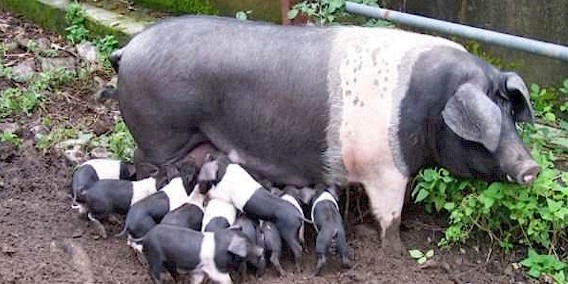 The Bazna is a pig
originally from the Transylvania region of Romania, and they are in
fact not vampires.
The Bazna is a pig
originally from the Transylvania region of Romania, and they are in
fact not vampires. The Bazna pigs are black with a white belt, medium withers height and body structure, and typically weighing 125 to 135 kilograms by their first year. They are mainly bred for their lard and lean meat.
The Bazna dates back to 1872, when they were created from crossing the Berkshire and Mangalitsa pig breeds. The offspring from that cross inherited the best traits from the Mangalitsa with their superior productive traits. The resulting hybrids were quickly spread around the neighboring towns in Transylvania.
Over the next decade, Berk boars were imported from England and were used to improve the ...

 Beijing Black
Beijing Black
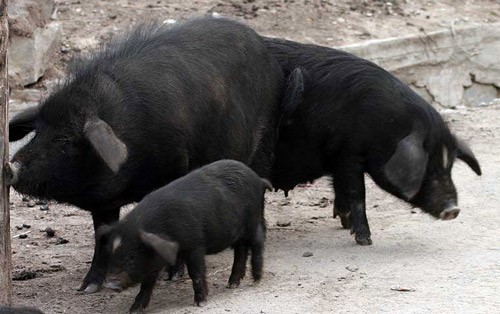 The Beijing Black Pig breed, widely distributed across China, is primarily recognized for its role as a meat-producing breed, characterized by a predominantly black coat adorned with occasional white markings. Its development dates back to 1962 when it originated from a selective crossbreeding program. This program aimed to enhance the breed''s attributes by incorporating genetic contributions from the Berkshire and Large White breeds, alongside local Chinese breeds like Dingxian, Shenxian, and Zhouxian. The deliberate amalgamation of these genetic lineages has contributed to the distinctive traits and desirable meat quality associated with the Beijing Black Pig breed.
The Beijing Black Pig breed, widely distributed across China, is primarily recognized for its role as a meat-producing breed, characterized by a predominantly black coat adorned with occasional white markings. Its development dates back to 1962 when it originated from a selective crossbreeding program. This program aimed to enhance the breed''s attributes by incorporating genetic contributions from the Berkshire and Large White breeds, alongside local Chinese breeds like Dingxian, Shenxian, and Zhouxian. The deliberate amalgamation of these genetic lineages has contributed to the distinctive traits and desirable meat quality associated with the Beijing Black Pig breed.

 Belarus Black Pied
Belarus Black Pied
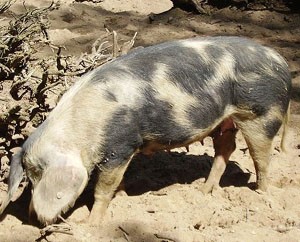 Belarus Black Pied Pigs are bred in the region surrounding Minsk in the Republic of Belarus, Eastern Europe. They are a meat and lard breed which was developed from Large White, Large Black, Berkshire, and Middle White breeds crossed with various local breeds in the late 1800''''s and in the 1920s.
Belarus Black Pied Pigs are bred in the region surrounding Minsk in the Republic of Belarus, Eastern Europe. They are a meat and lard breed which was developed from Large White, Large Black, Berkshire, and Middle White breeds crossed with various local breeds in the late 1800''''s and in the 1920s.They are known for their hardiness, adaptability and ability to forage for food in the wild. They are medium-sized, with a black and white color pattern and a broad snout. They are known for their meat which is considered to be more flavorful and tender than commercial breeds. The breed is also known to be efficient in converting feed into meat, which makes them good for smallholder farmers. The Belarus Black Pied pig is known for bei ...

 Belgian Landrace
Belgian Landrace
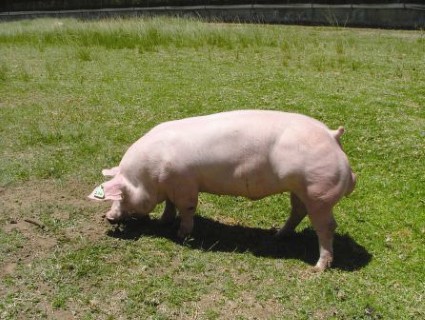 The Belgian
Landrace is a muscular white swine with heavy droopy ears. They are known as
the butchers pig, primarily because they are the most commonly used breed for
the consumer market. The Belgian Landrace can be described as a very practical
type of pig with good fertility, sound body mechanics, and good maternal
instincts, and plenty of milk for their piglets.
The Belgian
Landrace is a muscular white swine with heavy droopy ears. They are known as
the butchers pig, primarily because they are the most commonly used breed for
the consumer market. The Belgian Landrace can be described as a very practical
type of pig with good fertility, sound body mechanics, and good maternal
instincts, and plenty of milk for their piglets. The Belgian Landrace has met the demands of producing top quality pork for the consumer marketplace. The breed has also sparked interest from other countries with similar goals in crossbred swine production.
The Belgian Landrace breeds development began in the late 1920s, with the native Landrace type, which sought to improve their short, fat, and ...

 Bengali Brown Shanna
Bengali Brown Shanna
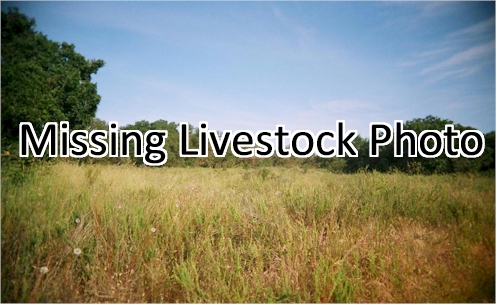 Bengali Brown Shannaj pig is a traditional breed of pig that is native to the region of Bengal, India. They are known for their hardiness, adaptability and ability to forage for food in the wild. Bengali Brown Shannaj pigs have a brown coat, a large body, and a broad snout. They are known for their meat which is considered to be more flavorful and tender than commercial breeds. The breed is also known to be efficient in converting feed into meat, which makes them good for smallholder farmers and low input systems. They are known to be resistant to many of the diseases that plague commercial pigs and well suited to the hot, humid climate of India and Bangladesh. The breed is also known to be docile and easy to handle, which makes them popula
...
Bengali Brown Shannaj pig is a traditional breed of pig that is native to the region of Bengal, India. They are known for their hardiness, adaptability and ability to forage for food in the wild. Bengali Brown Shannaj pigs have a brown coat, a large body, and a broad snout. They are known for their meat which is considered to be more flavorful and tender than commercial breeds. The breed is also known to be efficient in converting feed into meat, which makes them good for smallholder farmers and low input systems. They are known to be resistant to many of the diseases that plague commercial pigs and well suited to the hot, humid climate of India and Bangladesh. The breed is also known to be docile and easy to handle, which makes them popula
...

 Berkshire
Berkshire
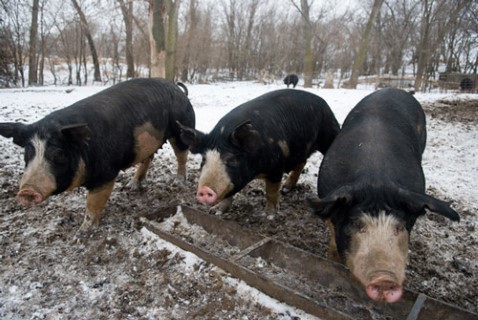 Berkshire are a small black pig
with prick ears, white socks, white tip to tail and flash on their face.
Berkshire are a small black pig
with prick ears, white socks, white tip to tail and flash on their face.During the 19th Berkshire pigs became very popular. Berkshire were soon exported to the USA. This trend continued throughout the century and by the end of the 19th century, herds were also established in Australia and New Zealand. Up until the first half of the 20th century, the breed grew in popularity. However, as with all colored pig breeds, the Berkshire suffered a serious decline in popularity following World War II when the demand for leaner bacon from white-skinned pigs increased.
Since then a number of breeders have developed their own specialized markets for Berkshire pig meat and Berkshire breedin ...

 Bisaro
Bisaro
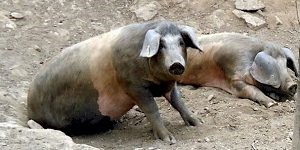 Bisaro pigs, a cherished heritage breed originating from Portugal, boast a captivating range of colors, spanning from a deep, velvety black to a delicate, almost ethereal pink hue, with some individuals showcasing enchanting variations in between. Their distinctive convex dorsal line lends them an elegant and robust appearance, adding to their allure.
Bisaro pigs, a cherished heritage breed originating from Portugal, boast a captivating range of colors, spanning from a deep, velvety black to a delicate, almost ethereal pink hue, with some individuals showcasing enchanting variations in between. Their distinctive convex dorsal line lends them an elegant and robust appearance, adding to their allure.
Mature Bisaro pigs typically reach heights of up to 95 centimeters, standing proudly as symbols of their heritage. Despite their imposing stature, they maintain a harmonious balance, weighing approximately 87 kilograms at maturity. This blend of strength and grace makes them a prized addition to traditional Portuguese agriculture.
Intriguingly, the historical roots of the ...

 Black Canary
Black Canary
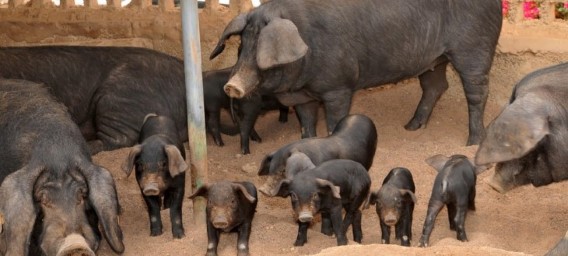 The Black Canary Pig, native to the Canary Islands, is a breed celebrated for its striking black coat, which distinguishes it in the world of swine husbandry. Renowned for its exceptional meat quality, the Black Canary Pig holds a revered status in the culinary realm, where its meat is highly sought after for its premium taste and tenderness.
The Black Canary Pig, native to the Canary Islands, is a breed celebrated for its striking black coat, which distinguishes it in the world of swine husbandry. Renowned for its exceptional meat quality, the Black Canary Pig holds a revered status in the culinary realm, where its meat is highly sought after for its premium taste and tenderness.This esteemed breed has garnered recognition not only locally but also on a global scale. Its meat is prized as gourmet fare in various international markets, including the USA, Brazil, India, Europe, and China. With its succulent and flavorful meat, the Black Canary Pig has become a preferred choice among chefs and discerning consumers alike, elevating it to the status of a premium culinary ...

 Black Salvonian
Black Salvonian
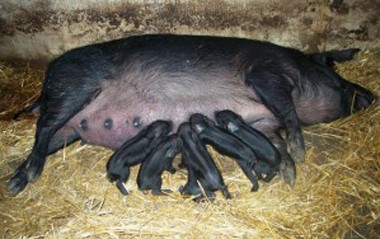 The Black Salvonian, a breed teetering on the brink of extinction, emerges as a poignant tale from the annals of Croatian pig breeding, celebrated for its delectable meat. This unique porcine lineage found its genesis at the confluence of the 19th and early 20th centuries through a meticulous fusion of the Mangulica, Berkshire, and Poland China pig breeds. Each of these ancestral contributors bestowed upon the Black Salvonian distinctive traits, creating a swine of both historical and gastronomic significance.
The Black Salvonian, a breed teetering on the brink of extinction, emerges as a poignant tale from the annals of Croatian pig breeding, celebrated for its delectable meat. This unique porcine lineage found its genesis at the confluence of the 19th and early 20th centuries through a meticulous fusion of the Mangulica, Berkshire, and Poland China pig breeds. Each of these ancestral contributors bestowed upon the Black Salvonian distinctive traits, creating a swine of both historical and gastronomic significance.
Renowned for its exceptional meat quality, the Black Salvonian''s journey through time reflects a decline in popularity among breeders, owing to the challenges posed by small litter sizes among the sows. This factor, couple ...

 Blue wild
Blue wild
 Blue wild pigs
were reported in North Canterbury, New Zealand, in the early twentieth century.
A 1922 publication noted: Perhaps the most interesting specimen of the
wild pig in this Dominion is the blue pig found in the Mount Grey and Karetu
districts, North Canterbury. The blue color is produced by a blend of
apparently equal numbers of white and black hairs. So fixed is the type that
blue pigs may be found in a litter with blacks or black and whites. The blue
pig, evidently, is the result of a cross between a black pig and a white pig,
and the progeny crossed and inbred until the two breeds are absolutely blended
as far as color is concerned.
Blue wild pigs
were reported in North Canterbury, New Zealand, in the early twentieth century.
A 1922 publication noted: Perhaps the most interesting specimen of the
wild pig in this Dominion is the blue pig found in the Mount Grey and Karetu
districts, North Canterbury. The blue color is produced by a blend of
apparently equal numbers of white and black hairs. So fixed is the type that
blue pigs may be found in a litter with blacks or black and whites. The blue
pig, evidently, is the result of a cross between a black pig and a white pig,
and the progeny crossed and inbred until the two breeds are absolutely blended
as far as color is concerned.In a study of wild pigs in the northern part of the South Island of New Zea ...

 Breitovo
Breitovo
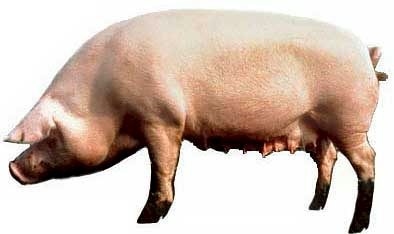 Breitovo pigs are a general purpose swine from Russia. They were bred in
the Yaroslavl region as a result of crossing local pigs with Danish landrace,
large white and medium white breeds of pigs. They became widespread in the
north-west of Russia, in the Volga region, and in the Urals. They were taken
out against a background of voluminous feeding with a large quantity of
potatoes.
Breitovo pigs are a general purpose swine from Russia. They were bred in
the Yaroslavl region as a result of crossing local pigs with Danish landrace,
large white and medium white breeds of pigs. They became widespread in the
north-west of Russia, in the Volga region, and in the Urals. They were taken
out against a background of voluminous feeding with a large quantity of
potatoes.They are predominantly white, but some have darker skins. They have great fertility strong constitution, and are large. Adult boars average 310-330 kg, sows 220-240 kg. Their head is of medium length with a noticeable curve of the profile, but not pug-shaped. Their ears are long and drooping. Their neck is of medium length, broad, and muscular. Th ...

 British Landrace
British Landrace
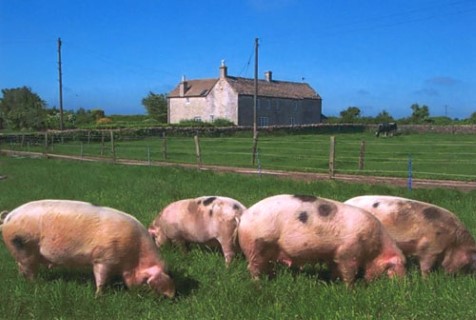 The
first Landrace pigs were imported into Britain from Sweden in 1949. In 1950,
the British Landrace Pig Society was formed to create a herd book for the first
offspring born and very soon an evaluation scheme was created. The first pig
testing scheme was for daily gain and fat depths, a testing station was built
at Stockton-on-Forest, York. This was one of the first examples of pig testing
in the UK.
The
first Landrace pigs were imported into Britain from Sweden in 1949. In 1950,
the British Landrace Pig Society was formed to create a herd book for the first
offspring born and very soon an evaluation scheme was created. The first pig
testing scheme was for daily gain and fat depths, a testing station was built
at Stockton-on-Forest, York. This was one of the first examples of pig testing
in the UK.Starting in 1953, more Landrace pigs were imported into Northern Ireland, the Isle of Man, and the Channel Islands. A few years later in 1978, the British Landrace Pig Society joined forces with NPBA and became the British Pig Association.
The popularity of the British Landrace breed has expanded rapidly since the ...

 British Lop
British Lop
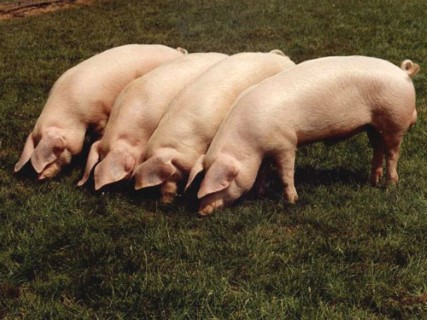 The British Lop Pig is a descendent of the lop-eared white pigs that
lived in the southwest English farmyards for centuries.
The British Lop Pig is a descendent of the lop-eared white pigs that
lived in the southwest English farmyards for centuries. The breed society was formed in 1920 under the name of the National Long White Lop- Eared Pig Society. The name was changed to the British Lop Pig Society in the 1960s.
As with most of the other rare breeds the decision in the 1950s to concentrate pig production on just three breeds (Landrace, Large White, and the Welsh) was disastrous for the British Lop. Numbers dropped and coupled with the breed’s relative confinement to the south west. The Lop became very rare and still is today, but there are now herds throughout the UK.

 British Saddleback
British Saddleback
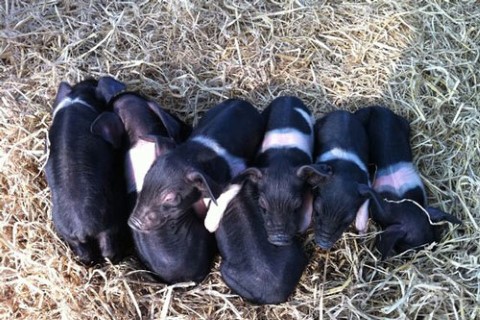 British
Saddleback pigs are a breed of domestic pig created in the 20th century from
the cross-breeding of Essex and Wessex Saddleback breeds.
British
Saddleback pigs are a breed of domestic pig created in the 20th century from
the cross-breeding of Essex and Wessex Saddleback breeds.In the 20th century Lord Western, while travelling in Italy, saw some Neapolitan pigs and decided thatthey were just what he needed to improve the breed of Essex pigs. He bought a pair of Neapolitan boars and crossed them with Essex sows. One Lord Westerns tenants named Fisher Hobbs of Boxted Lodge then used the Neapolitan-Essex boars and crossed them with his coarse Essex sows and in process established the Improved Essex breed.
British Saddleback pigs have a black head and neck, as well as a clearly defined belt of white extending over the shoulders and continuing ...

 Bulgarian White
Bulgarian White
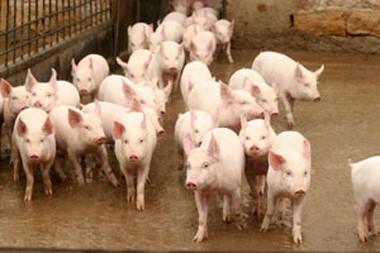 In the early 1960s, the Bulgarian government embarked on a mission to enhance the meat productivity of the nation''s indigenous Bulgarian White pig breed. To achieve this objective, they implemented a strategic plan involving the importation of 3,000 high-quality pedigree breeding stock from various countries, including the USSR, Sweden, and Poland. These imported pigs, primarily of Landras and Large White varieties, were deemed crucial for their superior genetic traits and meat-producing capabilities.
In the early 1960s, the Bulgarian government embarked on a mission to enhance the meat productivity of the nation''s indigenous Bulgarian White pig breed. To achieve this objective, they implemented a strategic plan involving the importation of 3,000 high-quality pedigree breeding stock from various countries, including the USSR, Sweden, and Poland. These imported pigs, primarily of Landras and Large White varieties, were deemed crucial for their superior genetic traits and meat-producing capabilities.
Upon their arrival, the imported breeding stock were distributed among pig farmers across the country, as well as to ten designated state farms. The primary aim was to facilitate crossbreeding programs with the local Bulgarian Whit ...
